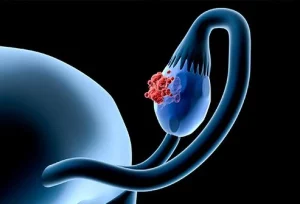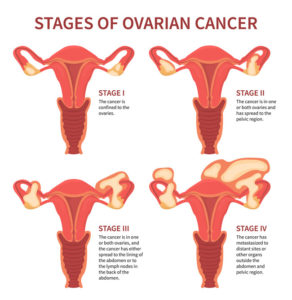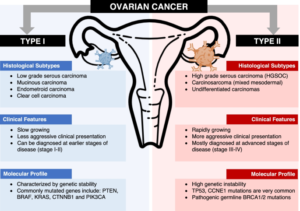Most people are aware that October is Breast Cancer Awareness Month, but how many of you are also aware that September is Ovarian Cancer Awareness Month?
This cancer, Ovarian Cancer, is the more silent sister to breast cancer-which takes over the month of October with a worldwide pink party and numerous product promotions, some tasteful and some less so. Maybe people and product promoters are just drawn to pink versus the more reserved teal blue color for ovarian cancer. More likely it’s because breasts are visual and ovaries are invisible to the eye.
Remember ovarian cancer is very visible to those diagnosed with it and to their loved ones. We need to make more noise about ovarian cancer awareness. First you have to listen… to your body. Ovarian cancer can be sneaky.
Symptoms such as indigestion, bloating, painful intercourse, menstrual irregularities and back pain, can point to other less invasive conditions. While breast cancer has screening protocols like mammograms and breast self-examination, there is no reliable screening for ovarian cancer. Unfortunately for many women the disease is often detected at an advanced stage. Both breast and ovarian cancer are diagnosed in women of all ages and ethnic backgrounds.
Ovarian cancer is a type of cancer that begins in the ovaries. Women have two ovaries, one on each side of the uterus. The ovaries — each about the size of an almond — produce eggs (ova) as well as the hormones estrogen and progesterone.
Ovarian cancer often goes undetected until it has spread within the pelvis and abdomen. At this late stage, ovarian cancer is more difficult to treat, just like most other cancers in late stages as well, and is unfortunately frequently fatal. Early-stage ovarian cancer, in which the disease is confined to the ovary, is more likely to be treated successfully.
Early-stage ovarian cancer rarely causes any symptoms. Advanced-stage ovarian cancer may cause few and nonspecific symptoms that are often mistaken for more common benign conditions, such as constipation or irritable bowel.
Signs and symptoms of ovarian cancer may include and don’t ever ignore them:
- Abdominal bloating or swelling
- Quickly feeling full when eating
- Weight loss
- Discomfort in the pelvis area
- Changes in bowel habits, such as constipation or diarrhea
- A frequent need to urinate (urgency including difficulty to void)
- Increased Abdominal Size
- Painful Sex
- Heavy menstrual bleedingWhen to see a doctorIf you have a family history of ovarian cancer or breast cancer, talk to your doctor about your risk of ovarian cancer. Your doctor may refer you to a genetic counselor to discuss testing for certain gene mutations that increase your risk of breast and ovarian cancers. Only a small number of women are found to have genetic mutations that can lead to ovarian cancer.
- Certain factors may increase your risk of ovarian cancer:
- Make an appointment with your doctor if you have any signs or symptoms that worry you.
Risk Factors:
- Age. Ovarian cancer can occur at any age but is most common in women ages 50 to 60 years.
- Inherited gene mutation. A small percentage of ovarian cancers are caused by an inherited gene mutation. The genes known to increase the risk of ovarian cancer are called breast cancer gene 1 (BRCA1) and breast cancer gene 2 (BRCA2). These genes were originally identified in families with multiple cases of breast cancer, which is how they got their names, but women with these mutations also have a significantly increased risk of ovarian cancer.
- The gene mutations that cause Lynch syndrome, which is associated with colon cancer, also increase a woman’s risk of ovarian cancer.
- Estrogen hormone replacement therapy, especially with long-term use and in large doses.
- Age when menstruation started and ended. If you began menstruating before age 12 or underwent menopause after age 52, or both, your risk of ovarian cancer may be higher.
- Never being pregnant.
- Fertility treatment.
- Smoking.
- Use of an intrauterine device.
- Polycystic ovary syndrome. In years past ovarian cancer used to be call the silent killer but it’s really not completely silent, at least in some patients. You shouldn’t ignore your symptoms!


